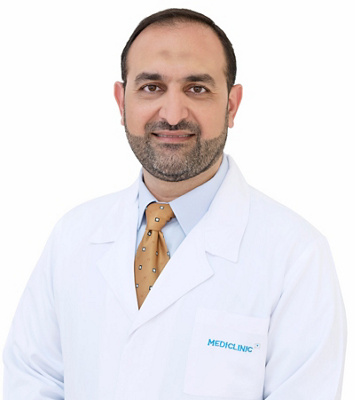Mediclinic Airport road Hospital, the first private hospital in Abu Dhabi to surgically implant a highly-advanced device that helps control seizures

A patient suffering from recurring epilepsy attacks has recently undergone a Vagus Nerve Stimulation (VNS) implantation at Al Noor Hospital – Airport Road, a surgery performed for the first time in a private hospital in Abu Dhabi. This small pacemaker-like device is used to control the frequency and intensity of drug-resistant epilepsy attacks.
The patient had been suffering from epilepsy attacks for more than three and a half years as a result of encephalitis, a very rare and serious condition that causes inflammation of the brain, affecting only 7 in 100’000 people yearly in western countries. In 2011, the patient contracted an Encephalitis causing virus and after several months of treatment he was left with memory loss, loss of speech, 5 different lifelong medications and 2 to 3 epilepsy attacks per month, often resulting in visits to the emergency room.
This unfortunate situation tremendously impacted the patient’s quality of life and hindered him from leading a normal one; lack of sleep, tiredness and the extremely hot weather were the main triggers for his seizures. As a result, both he and his wife went through distressing times throughout the long and difficult road to finding a solution for his serious medical condition.
The patient was referred by another medical center in Abu Dhabi to Dr. Anas Tawakol, Consultant Neurosurgeon at Al Noor Hospital Airport branch to undergo a Vagus Nerve Stimulation (VNS) implantation that will potentially help control and reduce his seizure frequency.
Dr. Tawakol who worked for many years in Bremen, Germany said: “Vagus Nerve Stimulation (VNS) implantation is a surgical procedure in which a control battery is implanted in the left chest wall and an electrode is wrapped around the vagus nerve that passes vertically down the neck within the carotid sheath while the patient is under general anesthesia. The device will then help control any involuntary body functions by sending mild electrical pulses to the brain via the vagus nerve once activated a few days post-surgery.”
Dr. Tawakol added: “We knocked on every door to make this service available for the patient and made history being the first private hospital in Abu Dhabi to perform this type of surgery on a patient who had been suffering for years from epilepsy.”
“The setting on the patient’s VNS device will be gradually increased over a number of weeks in an effort to improve his seizure control. Improvement post-surgery usually takes time in people who respond well to a VNS treatment. Studies have shown that people have different response patters to VNS therapy and the results may vary from one person to another” concluded Dr. Tawakol.
Although becoming seizure-free with VNS is not guaranteed, the therapy does provide a ray of hope for patients with drug-resistant epilepsy attacks as most do experience a better quality of life after undergoing the treatment.
